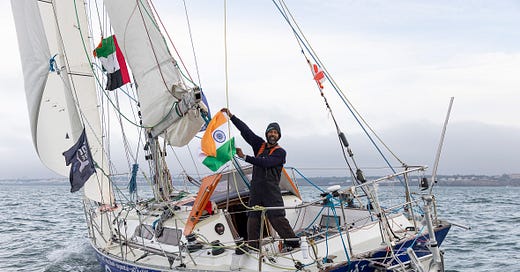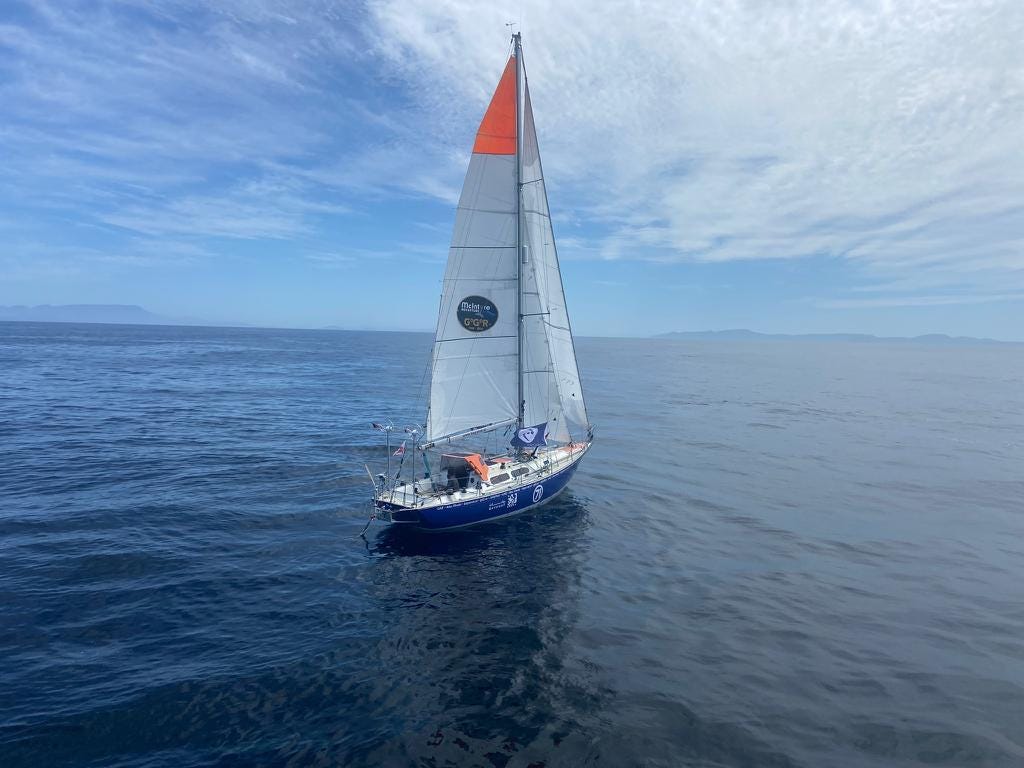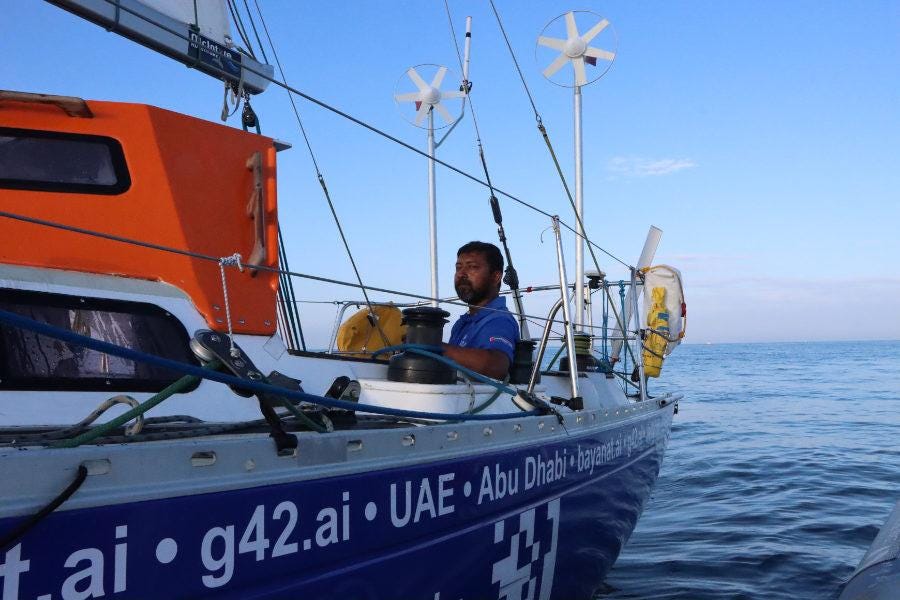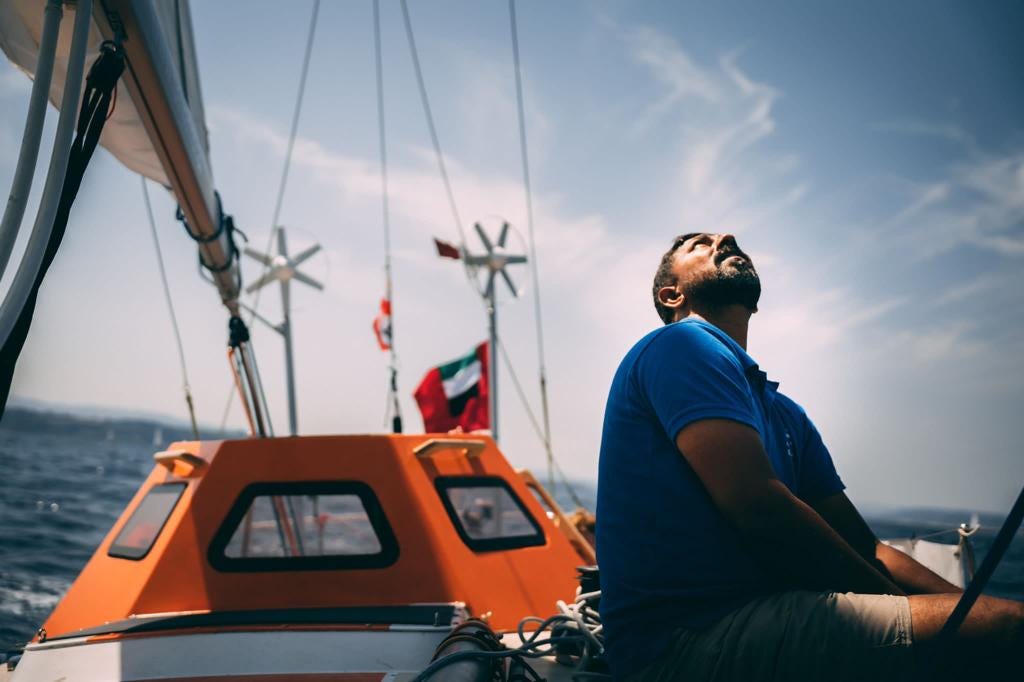What Cdr Abhilash Tomy teaches us
Last year, Cdr Abhilash Tomy (retd) scripted history when he finished on the podium of Golden Globe Race, considered the toughest yacht race in the world.
This time last year, the who's who of the Indian Navy were poring over reports of the wind pattern and weather system prevailing over the North Atlantic.
For the uninitiated, it likely seemed as if they were planning an elaborate campaign off the coast of France. But no, they were plotting the position of Bayanat and its skipper, Cdr Abhilash Tomy.
A former naval aviator, Cdr Abhilash was contesting the Golden Globe Race, considered one of the world's toughest yacht races. In its final leg, just when he was gaining ground, 'Titanium' Tomy had made a manoeuvre that surprised many.
While his fellow competitor and race leader Kirsten Neuschafer navigated east to return to Les Sables d'Olonne (LSO), a picturesque coastal town in France where the around-the-world race began last September, Cdr Abhilash continued to climb north.
Various theories were floated, but they all had a common denominator: that Cdr Abhilash knew what he was doing. There had been numerous instances in the race where he demonstrated just how good a sailor he was.
Two days later, Cdr Abhilash's 'risky' move paid rich dividends. Nearing the Azores, an archipelago in the North Atlantic, the Bayanat had the wind on its stern and was picking up speed.
"Boldness and panache were Cdr Abhilash's signature this weekend," read the race report released the following day.
Cdr Abhilash had covered nearly 160 miles and had closed the gap between him and Kirsten's Minnehaha down to just 7 nautical miles, all by following a gut instinct.
Unlike other sailing competitions, the Golden Globe Race does not permit the use of modern navigational instruments. Only what was available to Sir Robin Knox-Johnston in the inaugural race of 1968. So, no GPS, electric autopilot, chart plotters or electronic compasses.
Instead, the sailors must rely on celestial navigation, the sextant and the barometer to guide them. Also, they are neither aware of their own position nor of their competitors.
According to Don McIntyre, the race's founder and chairman, this 'retro-sailing' experience is in homage to the 'golden age' of sailing, when the marriage of traditional seamanship skills of the sailor and his ingenuity and passion decided the outcome of the race. Similar vectors proved pivotal around the Azores.
Cdr Abhilash did not win the race, Kirsten did. The South African's background as a professional sailor gave her the edge in the final lap of the race, while Bayanat, the most repaired vessel in the race's history, was caught in a tangle of last-minute hiccups that were no one’s fault.
But Cdr Abhilash was not disheartened in coming second. In fact, he was glad to have finished the race which, five years ago, had nearly killed him. Indeed, in 2018, during the previous edition of the race, Cdr Abhilash's boat, caught in the eye of the storm, had capsized leaving the sailor with a debilitating back injury. For three days, he was immobilised and adrift at the mercy of the fickle sea.
His rescue was one of the most dramatic moments in the race's history. With titanium rods in his spine, Cdr Abhilash had to learn to walk again. He did, and soon enough, longed to race again.
In finishing the Golden Globe Race last year, Cdr Abhilash was also able to voyage past the demons of the 2018 event. In addition, he is the first Asian to finish the race, thus scripting history.
Cdr Abhilash's courage, determination and propensity for humour when all hope seems lost had won his admirers across the world during the course of the race, Kirsten one among them. When the Bayanat touched base at Les Sables d'Olonne, Kirsten was there on the dock cheering for Cdr Abhilash.
His journey is an inspiration and teaches us many things. Perhaps the greatest takeaway is this: no matter how rough the seas are beneath us, anchor your eyes in the skies where a celestial ballad awaits the beholder.







